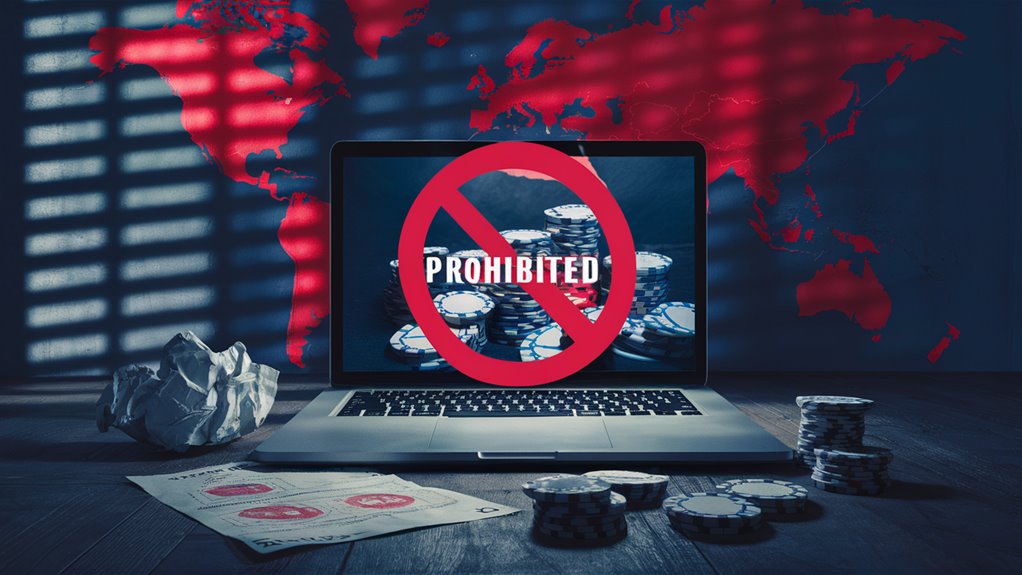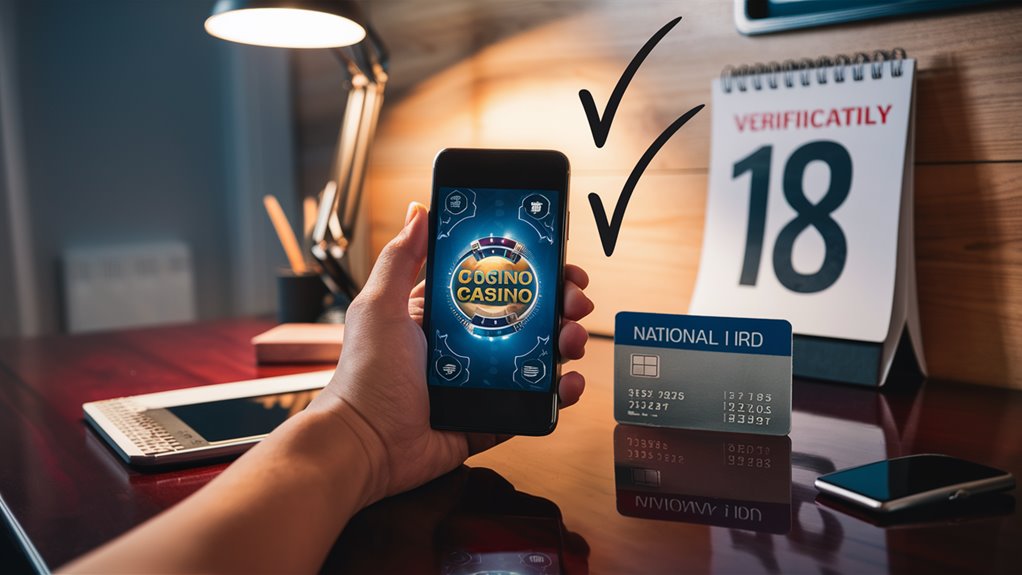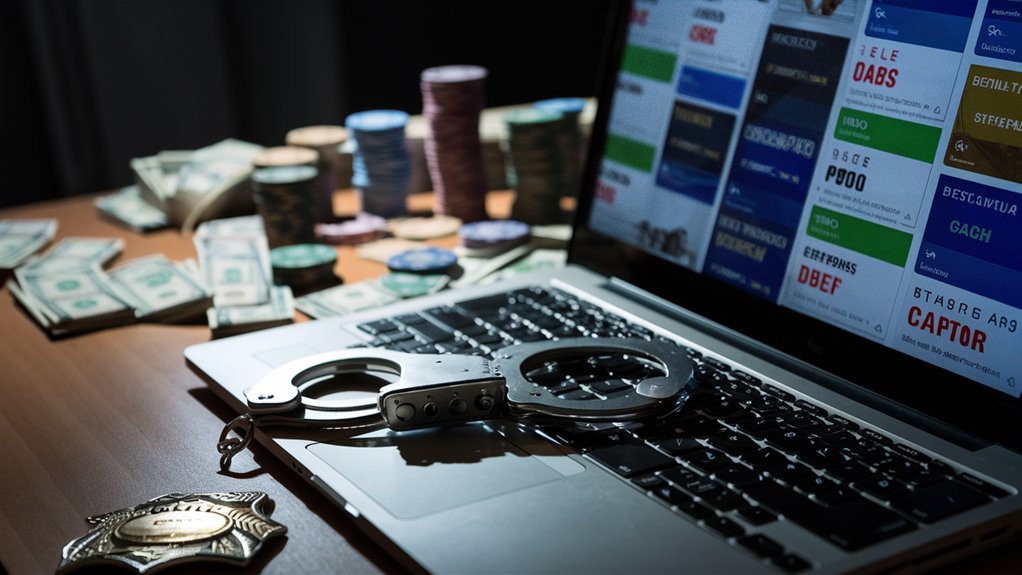Well, let's talk about the tricky world of online gambling laws. You know how you keep seeing those flashy casino ads and betting sites everywhere? Just because they pop up on your screen doesn't mean they're actually legal where you live.
Think about it this way: imagine walking into a store in a foreign country. What's perfectly fine to buy in one place might be completely off-limits in another. Online gambling works pretty much the same way. Some countries roll out the red carpet for it, setting up proper licenses and regulations to keep things in check. Others? They've put up a big "not welcome" sign with total bans.
Before you get excited about trying your luck online, you'll want to do a bit of homework. It's not just about whether you can access a gambling site, but whether you should. Your location plays a huge role here, and so does your age. Plus, not all gambling platforms are created equal, some might be legal in your area while others aren't.
You might be thinking, "If I can access the website, surely it must be okay?" Unfortunately, it's not that simple. The internet makes everything feel accessible, but the law doesn't always see it that way. Take a minute to check your local regulations, because what's perfectly fine for your friend across the border could land you in hot water where you live.
Global Online Gambling Regulations

Let's talk about online gambling regulations around the world. It's quite fascinating how different countries handle this, and trust me, it can get pretty complex.
You know how some places welcome online betting with open arms while others slam the door shut completely? Take the European Union, for instance. Countries like the UK and Malta are leading the pack with well-thought-out rules that let licensed operators run their businesses legally.
Before you think about placing any bets online, though, you'll want to get familiar with your local laws. Things can get a bit tricky, especially in places like the United States, where each state calls its own shots.
Just look at New Jersey, Pennsylvania, and Michigan, they're all in on legal online casino gaming. Meanwhile, hop over to Australia, and you can bet on sports but forget about online casino games. And Canada? Well, it's operating in this weird middle ground where offshore sites keep serving Canadian players.
Now, when it comes to Asia, things get even more interesting. Most countries there take a pretty hard stance against online gambling, but you'll find some exceptions.
Places like Macau and the Philippines have carved out special gambling zones. It's actually quite striking how enforcement varies from country to country.
China goes all out blocking gambling websites, while other Asian regions take a more relaxed approach. And here's the thing: these rules keep changing as governments try to keep up with new technology and shifting public opinions about online gambling.
Major Legal Gambling Markets
Let's dive into the world of legal gambling markets, shall we? You might be surprised to learn just how different gambling regulations are around the globe.
The United Kingdom really leads the pack here, with one of the most well-oiled gambling systems you'll find anywhere. Think of the UK Gambling Commission as a strict but fair referee, keeping everything in check while making sure players stay safe.
Now, if you've ever wondered where all those online gambling companies are based, look no further than Malta. This tiny Mediterranean island has become something of a gambling powerhouse, thanks to its business-friendly rules and EU membership.
Pretty clever, right? And across mainland Europe, countries like Sweden, Denmark, and Spain have jumped on board, creating their own regulated markets where you can place bets with licensed operators without breaking any rules.
The United States is actually quite an interesting case. Since 2018, things have really opened up, with individual states calling their own shots on gambling laws.
Take New Jersey, Pennsylvania, and Michigan, for instance. These states now offer pretty much every type of online betting you can imagine. Meanwhile, Down Under in Australia, you can bet on sports all day long, but don't expect to find any legal online casinos.
And speaking of changing landscapes, Canada's making moves too. Ontario recently rolled out its own regulated gambling framework, and boy, are the big operators excited about that! They're rushing in like kids to a candy store to serve this massive market.
Prohibited Gambling Territories

Let's talk about online gambling restrictions around the world. You might be surprised to learn that while many countries are opening up to internet betting, quite a few still keep their doors firmly shut. Here's what you need to know if you're thinking about placing bets online.
Well, if you happen to be in places like China, Japan, or most Middle Eastern countries, you're out of luck. These nations have completely banned online gambling, and there's a good reason for that. Some countries base their decisions on religious values, while others are just trying to protect their citizens from gambling-related problems.
Take Islamic countries, for instance. If you're in Saudi Arabia, Iran, or the UAE, you won't be able to access gambling websites at all.
It's not just frowned upon, it's actually considered haram (that means forbidden in Islamic law). And you know what? Countries like Thailand and Cambodia take it really seriously too. They've got some pretty tough laws against online betting, and you definitely don't want to end up on the wrong side of those.
But here's where it gets a bit tricky. Some countries are kind of in the middle, with partial restrictions.
Take Russia, for example. You can only gamble in specific zones they've set aside for it, and online betting? Super restricted.
Or look at Brazil, where you can try your luck with government lotteries, but most other forms of online gambling are off-limits. And trust me, you don't want to test these laws.
The penalties can be pretty harsh, ranging from huge fines to actual jail time in some places.
Licensing Requirements for Operators
Let's talk about what it really takes to run a legitimate online casino. You know how everyone thinks it's just about having a flashy website and some games? Well, there's actually a lot more to it, and it all starts with getting the right license.
Think of a gambling license as your golden ticket to operating legally. You'll need to get approval from respected authorities like the Malta Gaming Authority, UK Gambling Commission, or Curacao eGaming. And trust me, these folks don't just hand out licenses to anyone who asks.
So what do these regulators want to see? First off, they'll need proof that your company is financially solid. This means opening your books, sharing detailed business plans, and showing how you'll keep player funds safe.
Oh, and you'll definitely need robust anti-money laundering protocols and strict know-your-customer procedures in place. Most regulators insist on separate accounts for your operational money and player balances.
Now, about your actual gambling platform. It needs to pass some pretty intense technical testing. We're talking verification of fair gameplay, random number generation, the works.
Plus, you'll need to build in responsible gambling tools and set up clear procedures for handling player complaints.
Here's where it gets interesting: the cost. Annual license fees can vary wildly, starting at around $20,000 and going up to several hundred thousand dollars, depending on where you're getting licensed.
The whole process usually takes between 3 to 6 months, but that's just the beginning. Once you're licensed, you'll need to keep proving you're following the rules through regular compliance audits.
This means keeping detailed records, submitting reports, and staying on top of any new regulations that pop up. It's quite a journey, but it's absolutely necessary if you want to run a legitimate operation.
Player Verification and Age Restrictions

Let's talk about player verification in online gambling, because it's probably one of the most important things you need to know about.
Before you can jump in and place your first bet, there's this whole process called KYC (Know Your Customer) that you'll need to go through. Think of it as a security checkpoint, really. You'll need to show some government-issued photo ID, prove where you live, and sometimes even provide extra documents to confirm you're who you say you are.
Now, about age restrictions. Well, they're different depending on where you live, but most places want you to be at least 18 or 21 years old before you can legally gamble online.
Gambling sites take this super seriously, and they've got pretty strict systems in place to make sure nobody's trying to bend the rules. When you sign up, you'll need to put in your birth date, and they'll check this against your documents to make sure everything matches up.
Here's the thing about online gambling security: if you try using someone else's payment method or create multiple accounts, you'll probably get caught pretty quickly.
These days, gambling sites use some pretty sophisticated tech to keep things secure. We're talking facial recognition, document scanning, the works. They'll also check if you're gambling from somewhere it's actually allowed and that you haven't previously asked to be blocked from gambling sites.
And just so you know, if you try to get around these rules by giving false information or skip the verification process altogether, you could find yourself in some serious trouble. Your account will definitely get shut down, and you might even face legal problems.
Payment Methods and Banking Laws
Let's talk about moving money around for online gambling. It can be pretty confusing at first, but don't worry, we'll break it down together.
Once you've gotten through all the verification stuff, you'll need to figure out how to safely and legally move money in and out of your gambling account.
Most legit gambling sites give you plenty of options, like credit cards, bank transfers, e-wallets, and even cryptocurrency. But here's the thing: your country's banking laws might throw a wrench in the works by restricting certain payment methods.
Take the US, for instance. They've got this law called UIGEA (quite a mouthful, right?) that stops banks from processing payments to illegal gambling sites.
So you'll need to make sure whatever payment method you pick follows the rules where you live. Fun fact: many banks will automatically say "no" to anything that looks like gambling, even in places where it's totally legal.
That's why a lot of people turn to e-wallets like PayPal, Skrill, and Neteller. Think of them as middlemen between your bank and the gambling site.
And then there's cryptocurrency, which some folks prefer because it's more private and skips around traditional banking restrictions. Just remember to check if your chosen site actually takes crypto and if it's legal in your area.
Before you start moving your money around, there are a few more things to consider. Take a good look at the site's limits on deposits and withdrawals, how long transfers take, and any sneaky fees they might charge.
Oh, and here's something people often forget: the ways you can take money out mightn't be the same as the ways you can put it in. So definitely check that out too.
Penalties for Illegal Gambling Activities

Let's talk about what happens when you get caught gambling illegally. Trust me, it's not pretty. Whether you're just placing a few bets or running the whole operation, breaking gambling laws can seriously mess up your life.
So here's the deal with basic gambling violations. If you're caught placing illegal bets, you're probably looking at misdemeanor charges. That mightn't sound too bad, but it could still land you with a $1,000 fine and, get this, up to six months behind bars, even for a first offense.
Now, if you're thinking about running an illegal gambling operation, well, that's a whole different ball game. We're talking felony territory here, and the consequences are no joke.
You could face up to five years in prison and fines that'll make your head spin, up to $250,000. And if you take your operation international? That's when the federal authorities step in with laws like the Wire Act and UIGEA.
Those charges could put you away for up to 20 years.
But wait, there's more. The authorities won't just stop at fines and jail time. They'll grab anything connected to your gambling activities, from computers to cash.
Your bank accounts? Frozen. Want to visit legitimate casinos? Good luck with that, because you'll likely be banned. And if you're not a citizen, you're in even deeper trouble.
Immigration officials take gambling violations seriously, and you might find yourself facing deportation or serious immigration problems.
Common Questions
How Do I Report an Unlicensed Gambling Website Operating in My Country?
Let's talk about dealing with those sketchy gambling websites that pop up where they shouldn't. You know the ones I'm talking about, operating without proper licenses and potentially putting people's money at risk.
If you've spotted an illegal gambling site, here's what you can do about it. Your first and best move is to get in touch with your country's gambling commission. Think of them as the referees of the gambling world, they're the ones who make sure everyone's playing by the rules.
Not sure where to find them? A quick online search for "[your country] gambling authority" should point you in the right direction. These organizations usually have dedicated hotlines or online forms specifically for reporting suspicious gambling operations.
But wait, there's more than one way to tackle this issue. Your local police department might be interested too, especially if they have a cybercrime unit. After all, illegal gambling often connects to other types of online crime.
Look, reporting these sites isn't just about following rules. It's about protecting people in your community from potential scams and helping maintain a fair playing field for legitimate gambling businesses that actually follow the law.
Can I Legally Claim Gambling Winnings if I Played From a Restricted Location?
Let's tackle a tricky gambling question that comes up pretty often. You know how it goes: you're playing online, win big, and then realize you might have been in a restricted area. Not great news here, but we need to be straight about this.
The short answer? You can't legally claim those winnings. Think of it like trying to cash a check from a business deal that wasn't legal in the first place. The law simply won't back you up on this one.
Here's the thing: when you gamble from a restricted location, you're essentially participating in an illegal activity. It doesn't matter if you won fair and square or if the platform actually paid out. Courts won't help you collect these winnings because, well, they can't enforce something that wasn't legal to begin with.
Imagine trying to get legal help collecting money from an underground poker game. No judge would touch that case, right? The same principle applies here. The location where you placed your bets matters a lot more than you might think.
Do Gambling Losses Qualify as Tax Deductions in Regulated Markets?
Let's talk about gambling and taxes, because there's good news for those who itemize their deductions. Here's the deal: you can actually deduct your gambling losses, but there's a catch.
First off, you can only deduct losses up to the amount you've won. So if you won $5,000 but lost $7,000, you can only write off $5,000 of those losses. It's like having a ceiling on your deductions.
The key here is proper documentation. You'll need to keep meticulous records of both your wins and losses throughout the year. This means saving things like:
- Casino receipts
- Betting slips
- Bank statements
- Win/loss statements from gambling establishments
- A personal gambling diary or log
Now, there's another important detail: you must itemize your deductions on Schedule A of your tax return. This means if you take the standard deduction, you won't be able to claim those gambling losses. Yep, it's that straightforward.
Think of it this way: the IRS wants proof that you're being honest about both sides of your gambling activity. They're not just going to take your word for it. So if you're planning to deduct those losses, make sure you're keeping track of everything right from the start.
What Happens to My Account Balance if My Country Suddenly Bans Online Gambling?
Let's talk about what happens to your gambling funds when your country suddenly decides to put the brakes on online betting. You know how governments can sometimes make unexpected regulatory changes, right?
Well, here's the good news: If online gambling gets banned in your country, you won't just lose access to your money overnight. Reputable gambling sites actually have solid procedures in place for situations like this. They'll typically give you a reasonable window of time to get your affairs in order and withdraw your funds.
Think of it like a store going out of business. Just as shops don't shut their doors without warning, gambling operators will usually send you notifications about the upcoming changes. They'll outline the steps you need to take and, most importantly, give you clear instructions on how to withdraw your balance.
The grace period can vary, but legitimate operators understand the importance of letting their customers retrieve their funds properly. So while you might need to act relatively quickly, you'll generally have enough time to close your account and get your money back through your preferred withdrawal method.
Just remember to keep an eye on your email inbox and respond promptly to any notifications from your gambling site. The sooner you take action, the smoother the withdrawal process will be.
Are Social Casino Games With Virtual Currency Subject to Gambling Regulations?
Let's dive into the interesting world of social casino games and their relationship with gambling regulations. You might think these virtual currency games are completely free from legal oversight, but it's not quite that simple.
Here's the thing: when you're playing these games with virtual coins or tokens, they generally don't trigger the same strict gambling laws that real casinos face. After all, you're not betting actual money on each spin or hand, right?
But wait, there's a catch. Many of these games offer in-app purchases where you can buy more virtual currency with real money. And some even let you redeem prizes or rewards. This is where things get a bit tricky from a legal standpoint.
Think of it like this: if you're playing Monopoly with friends using the game's fake money, nobody's going to regulate that. But the moment real money enters the picture, even indirectly, regulators start paying attention.










